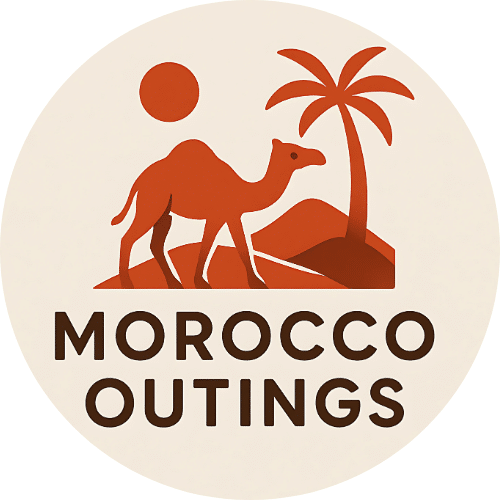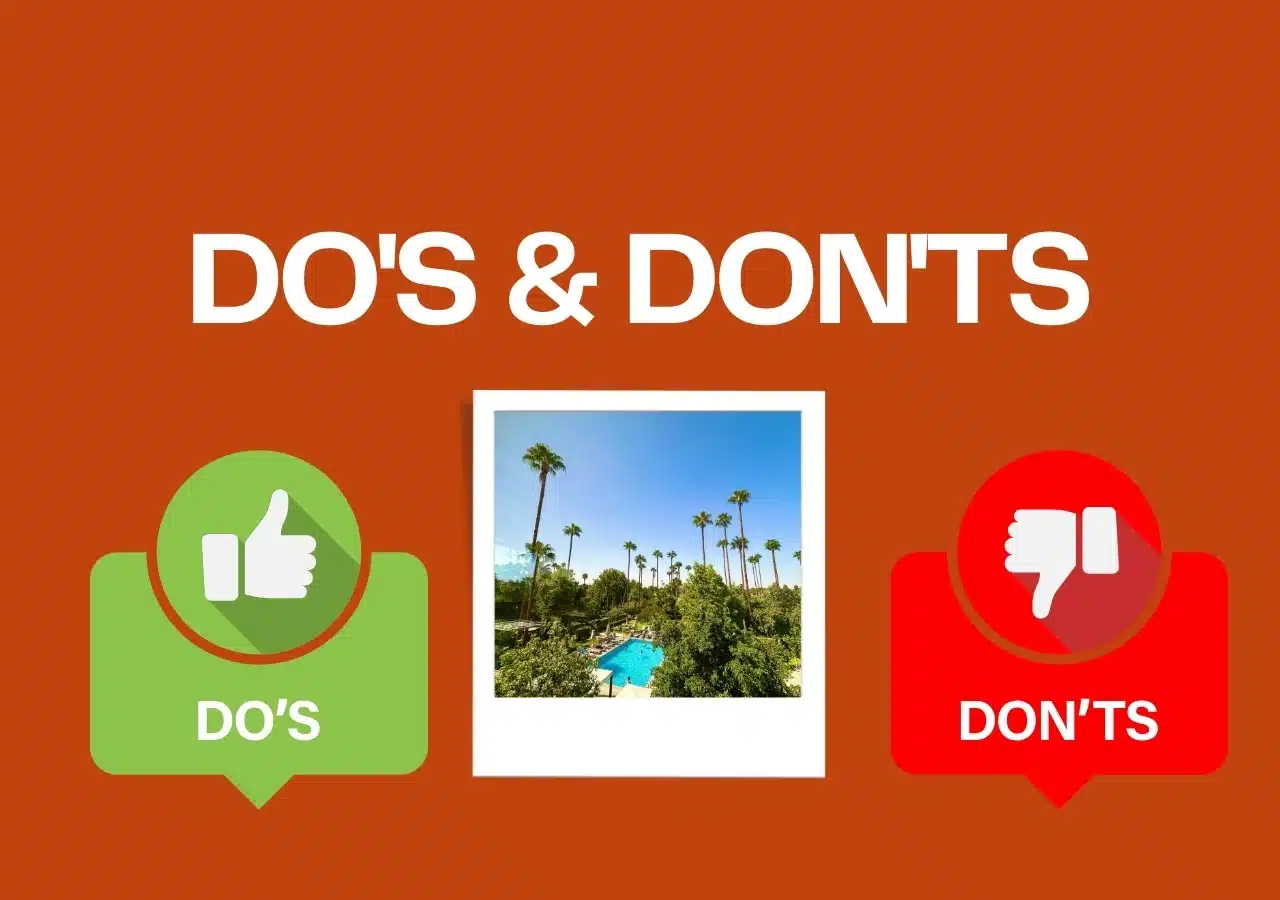Do’s and don’ts while visiting Morocco
DO
Do spend time chatting with people. Moroccans are known for warmth, wit, and generous hospitality. A brief greeting can turn into tea, directions, or a new friend. Accept kindness with gratitude and reciprocity.
Do learn basic Darija (Moroccan Arabic). Even a few phrases open doors and earn smiles. Keep pronunciation light and relaxed.
Mini phrasebook (Darija):
| English | Darija (Moroccan Arabic) |
|---|---|
| Hello | Salam ʿlikom |
| Reply (peace be upon you too) | Wa ʿlikom salam |
| Good morning / evening | Sbah l-khir / Msa l-khir |
| Please | ʿafak |
| Thank you | Shukran / Barak Allah fik |
| Yes / No | Iyeh / La |
| Excuse me / Sorry | Smeh liya |
| What’s your name? (to man) | Shno smitek? |
| What’s your name? (to woman) | Shno smitek? |
| My name is… | Ana smiti… |
| Where is…? | Fin…? |
| Where is the bathroom? | Fin l-toilet? |
| How much is this? | Bsh-hal had shi? |
| Too expensive | Ghali bzzaaf |
| Okay / Enough | Safi |
| Very good | Zwin bzzaaf |
| I don’t understand | Ma fhemt-sh |
| I speak a little Arabic | Kanhder shwiya b-lʿrbiya |
| No, thank you | La, shukran |
Do ask when you don’t understand. If a custom, price, or instruction is unclear, just ask. Most people will happily explain or show you.
Do savor Moroccan food—street to sit-down. Follow the crowds and your nose. Popular staples include tagines, couscous, rfissa, harira, pastilla, briouat, zaalouk, taktouka, bessara, msemen, batbout, sfenj, chebakia, sellou, raib, and fresh seasonal fruit. Choose clean, busy spots and watch food cooked to order when possible.
Do try traditional drinks (non-alcoholic and alcoholic where appropriate). Mint tea is the classic welcome; fresh juices are common. In licensed venues, you may find local wines, lagers, and the heritage fruit spirit mahia—always enjoy discreetly and in moderation.
Do pick a central base. Staying in a well-connected neighborhood reduces transit time between sights, markets, and transport hubs.
Do dress modestly in towns and villages. Cover shoulders and knees; carry a scarf or light layer for religious or official spaces. At pools and private beaches, swimwear is fine—cover up when leaving those areas.
Do keep public affection low-key. Friendly handshakes and light gestures are fine; kissing and extended hugging in public can draw disapproval.
Do double-check directions. Confirm with more than one person or use a map app plus a local sanity check.
Do be cautious crossing roads. Traffic can be assertive. Cross with locals or at clear gaps; make your movements predictable.
Do use licensed taxis or reputable ride-hailing. Agree on price before moving if there’s no meter. If metered, make sure it’s on. Keep small bills for payment and a modest tip.
Do carry small change and coins. Small shops, markets, and cafés may be cash-only; exact change speeds things up.
Do tip. Rounding up or leaving a few dirhams is normal at cafés and casual eateries; a bit more for sit-down restaurants or guided services. Porters and small helpers also appreciate a coin or two.
Do bargain (politely) in markets. Start with a smile, ask the price, counter at roughly half to two-thirds depending on the item, and work toward a friendly middle. If it’s not for you, say “La, shukran” and walk away kindly.
Do respect religious spaces. If entry is permitted to visitors, dress modestly, remove shoes where required, keep voices low, and follow posted guidance. If it’s not open to visitors, admire from outside.
Do be mindful during Ramadan. Daytime eating, drinking, or smoking in public may be seen as insensitive. After sunset, festivities flourish—follow local cues.
Do use your right hand for giving/receiving. Passing money, food, or gifts with the right hand (or both hands) is courteous.
Do consider a local SIM or eSIM. Connectivity helps with maps, translations, and ride apps.
Do keep copies of important documents. Store photos of your passport and cards in a secure cloud folder and keep originals safe.
Do book activities with registered operators. For desert trips, hikes, hammam treatments, or cooking classes, choose reputable providers with clear pricing and safety practices.
Do try a traditional hammam (bathhouse) with etiquette. Men and women use separate areas or times. Bring or rent sandals, scrub glove, and towel; wear provided coverings as directed; follow staff guidance.
Do pace yourself. The climate can be dry and hot; hydrate, rest midday when needed, and wear sunscreen.
DON’T
Don’t rent a car unless you’re comfortable with assertive driving. You’ll need the proper license and confidence with local habits. Many visitors prefer drivers, taxis, or ride-hailing.
Don’t stress about relaxed timing. Plans can shift; build buffers into your schedule and keep the day flexible.
Don’t wear very revealing outfits away from resort settings. Tank tops, short shorts, and midriff-baring styles draw attention in towns and rural areas. Opt for breathable, modest clothing.
Don’t accept unsolicited “guide” offers. Politely decline surprise escorts to shops or “secret” viewpoints. Book with registered guides instead.
Don’t follow strangers into restricted or “special access” areas. If an area is closed or roped off, respect the boundary—even if someone claims they can take you in.
Don’t rely on tap water if you have a sensitive stomach. Choose bottled or filtered water; skip ice if unsure. Refillable bottles are better for the environment.
Don’t drink alcohol in the street. Keep drinking to licensed venues or private settings. Never pressure someone to drink; many people abstain for religious or personal reasons.
Don’t be intimidated by persistent vendors. A friendly but firm “La, shukran” and steady walking usually ends the pitch. Avoid arguing or showing frustration.
Don’t photograph people without permission. Always ask first, especially for close-ups or portraits. Skip photos of security personnel, facilities, or vehicles.
Don’t enter prayer spaces during prayer if you’re not praying. Wait until services finish and follow posted rules. Modest dress applies.
Don’t point the soles of your shoes at others or put feet on tables. It’s considered disrespectful.
Don’t pet street animals. Scratches and bites carry health risks. Support vetted shelters if you wish to help.
Don’t fly drones without authorization. Import and use are regulated; devices can be seized if permits are lacking.
Don’t flash large sums of cash or valuables. Keep wallets, phones, and cameras discreet; use hotel safes when available.
Don’t over-promise when bargaining. If you make a counteroffer, be prepared to buy at that price. Walking away politely is fine if you’re unsure.
Don’t assume everyone shakes hands. Some people avoid physical contact with the opposite sex. A nod and smile are always safe; follow the other person’s lead.
Don’t eat or drink while walking through conservative areas. Even outside Ramadan, stationary, seated eating is more discreet; observe local behavior.


